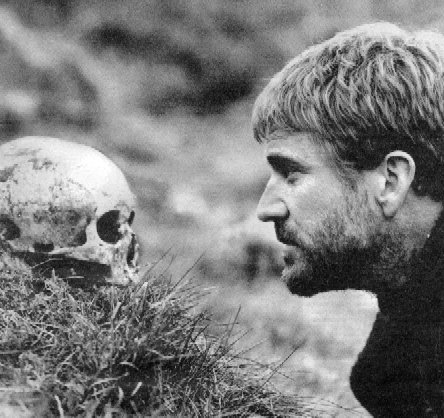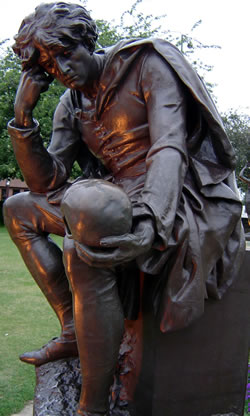| Irish Forums Message Discussion :: Shakespeare Hamlet was Irish. Togail Bruidne Da Derga Hamlet |
   | Irish Forums :: The Irish Message
Forums About Ireland and the Irish Community, For the Irish home and Abroad. Forums include- Irish Music, Irish History, The Irish Diaspora, Irish Culture, Irish Sports, Astrology, Mystic, Irish Ancestry, Genealogy, Irish Travel, Irish Reunited and Craic
|  
|
Shakespeare Hamlet was Irish. Togail Bruidne Da Derga Hamlet
 

|
|
|
| Irish
Author |
Shakespeare Hamlet was Irish. Togail Bruidne Da Derga Hamlet Sceala Irish Craic Forum Irish Message |
|
Irish Tim Brazil
Sceala Philosopher
Location: Recife Brazil
|
| Sceala Irish Craic Forum Discussion:
Shakespeare Hamlet was Irish. Togail Bruidne Da Derga Hamlet
|
|
|
It is OK to like Shakespeare, he was a good Catholic boy and it seems William Shakespeare liked a good Irish tale.
Frailthy thy name is Irish, could be the new refrain for Shakespeare’s tragic prince of Denmark, if recent literary research is correct.
Hamlet’s name may come from a character in a medieval Irish story and could date back hundreds of years earlier than thought, according to a paper published in the latest edition of the journal Review of English Studies.

The name may come from a character called Admlithi found in an Irish tragedy of a doomed high king Togail Bruidne Da Derga , writes Dr Linda Collinson from the Centre for Scandinavian Studies at the University of Aberdeen.
“As soon as I saw Admlithi I thought of Hamlet,” she said.
The title translates as The Destruction of Da Derga’s Hostel and was written in the 11th century but based on 8th or 9th century materials. It tells the story of a high king who broke social taboos.
He was killed as a result in a strange hall full of mysterious figures. Among these figures was a troupe of actors (players), one of whom was called Admlithi.
The name Admlithi came from the old Irish verb “mlithi” to grind or crush and could mean greatly-ground, according to the new study. The world Admlithi may have been brought to Scandinavia by sailors, said Dr Collinson. It may have been used by them to refer to dangerous waters such as a whirlpool or an area of grinding sea. This whirlpool could have been near Rathlin Island, she said.
Scholars have long agreed that Shakespeare based the central character of his play on a legendary 13th century Danish figure called Amlethus. The name of this Danish figure has been traced back to the word Amlothi in a 10th or 11th century Icelandic poem.
Dr Collinson has argued that this Icelandic word came from the Irish name. It was highly unlikely to be Norse with no convincing way to explain its origin from known Norse words, she said.
Separately, an Irish translation of Macbeth, An Bron-Chluiche Macbeit , was yesterday published as an e-book by Cló Litriocht.
http://www.irishtimes.com/newspaper/ireland/2011/0304/1224291281312.html
Admlithi is Hamlet
Was this ancient Irish folklore saga the real Hamlet
Togail Bruidne Da Derga (English: The Destruction of Da Derga's Hostel) is an Irish tale belonging to the Ulster Cycle of Irish mythology. It survives in three Old and Middle Irish recensions. It recounts the birth, life, and death of Conaire Mór son of Eterscel Mor, a legendary High King of Ireland, who is killed at Da Derga's hostel by his enemies when he breaks his geasa. It is considered one of the finest Irish sagas of the early period, comparable to the better-known Tain Bo Cuailnge.
The theme of gathering doom, as the king is forced through circumstances to break one after another of his taboos, is non-Christian in essence, and no Christian interpretations are laid upon the marvels that it relates. In its repetitions and verbal formulas the poem retains the qualities of oral transmission. The tone of the work has been compared with Greek tragedy.

Summary of Togail Bruidne Da Derga
After Conaire Mór has already broken several of his taboos, he travels south along the coast of Ireland, he is advised to stay the night at Da Derga's Hostel, but as he approaches it, he sees three men dressed in red riding red horses arriving before him. "Da Derga" means "Red God". He realises that three red men have preceded him into the house of a red man, and another of his geasa has been broken. His three foster-brothers, the three sons of Dond Désa, whom Conaire had exiled to Alba (Britain) for their crimes, had made alliance with the king of the Britons, Ingcél Cáech, and they were marauding across Ireland with a large band of followers. They attack Da Derga's Hostel. Three times they attempt to burn it down, and three times the fire is put out. Conaire, protected by his champion Mac Cécht and the Ulster hero Conall Cernach, kills six hundred before he reaches his weapons, a further six hundred with his weapons. He asks for a drink, but all the water has been used to put out the fires. Mac Cécht travels across Ireland with Conaire's cup, but none of the rivers will give him water. He returns with a cup of water just in time to see two men cutting Conaire's head off. He kills both of them. Conaire's severed head drinks the water and recites a poem praising Mac Cécht. The battle rages for three more days. Mac Cécht is killed, but Conall Cernach escapes.
Togail Bruidne Da Derga Manuscript tradition
The tale exists in three recensions:
Recension I
Recension I is the earliest version of the saga, which briefly summarizes the main events of the narrative. It is alternatively known as Orgain Bruidne Uí Dergae (The Massacre of Ua Derga's Hostel), the title given in Lebor na hUidre, in order to keep it distinct from the later recensions.
* 23 N 10 (RIA): p 72.
* Egerton 88: f 13rb (BL)
* G 7: col. 5 (NLI)
* H 3.18: XVIII, p 556a-556b col. 2 (TCD)
* 23 E 25 or Lebor na hUidre (LU): p 99a (f 98b-99a). Later version.
Togail Bruidne Da Derga Recension II
Recension II, a composite text, is the most famous version of the tale. On the basis of a number of contradictions, inconsistencies and duplicates in the tale, scholars such as Heinrich Zimmer, Max Nettlau and Rudolf Thurneysen suggested, each in his own way, that the recension represents a conflation of two, possibly three, variant sources. However, Máire West has pointed out the weaknesses inherent to their approach and instead favours the more flexible view that the author drew from a greater variety of written and oral sources.
* H 2.16 or Yellow Book of Lecan (YBL): III, col. 716-739 (facs.: p 91a1-104a17). Complete.
* H 2.16 or Yellow Book of Lecan (YBL): p 432-3. Fragment.
* RIA MS D IV 2: f 79ra 1 - 92ra 40. Complete.
* 23 E 25 or Lebor na hUidre (LU): p 83ra-99ra (+H). Beginning missing
* Additional 33993: I, f 4r-5v - or f 2b-5b (?) -(BL). Beginning only.
* Egerton 1782: f 108vb-123vb. Composite text.
* Egerton 92: f 18ra-23v. Fragment = Fermoy.
* 23 E 29 or Book of Fermoy: II, p 213a-216b. Fragment.
* H 2.17: p 477a-482b (TCD). Three fragments.
* H 3.18: XVII, p 528-533. Glossed extracts.
Recension III Togail Bruidne Da Derga
The youngest and longest version is represented by Recension III, to which further materials have been added, including a king-list, a version of Tochmarc Étaine and further dindsenchas lore.
* Egerton 1782, f 106r-123vb (ends in hiatus) (BL)
* H.1.14, f 24-52b (TCD). Copy of previous text.
The translation by J. Gantz, in Early Irish Myths and Sagas (1986) has an introduction that discusses its probable relationship to a king's ritual death, more fully explored by John Grigsby, Beowulf and Grendel 2005:150-52.
Hamlet was Irish
Was the great Dane Irish? That is the question
Medieval Scandinavian expert traces name Hamlet to Gaelic tale The Destruction of Da Derga's Hostel
Not "O Hamlet" but O'Hamlet: Shakespeare's Prince of Denmark, according to literary research, derives his peculiar name from ancient Irish origins.
The identity of the Prince of Denmark has fascinated scholars for centuries, with disputes about the name's Jutish, Icelandic or Latin etymology jostling for academic pre-eminence.
guardian.co.uk/culture/2011/mar/03/great-dane-irish-hamlet
Now Dr Lisa Collinson, a medieval Scandinavian expert at Aberdeen University, has published research which traces the unusual word to a little known Gaelic mystery tale from the dark ages.
Shakespeare is known to have borrowed the name Hamlet from a contemporary History of the Danes that had been translated into French. That version in turn was based upon Scandinavian sagas recorded by a 10th or 11th century Icelandic author known as Snow Bear; one verse even refers to a character called Amlothi.
But Collinson, whose work is published in Oxford University Press's prestigious Review of English Studies, does not abandon her detective work at the conventional explanation adopted by most Shakespearean enthusiasts.
"We can take this further, and match Amlethus and Amlothi with the Gaelic name Admlithi (the "d" is silent) which is related to a Gaelic word for grinding," she explained.
Collinson maintains that Snow Bear's Amlothi was probably a corruption of this Gaelic name, used to describe part of the grinding sea – a motif underlying the text's theme.
Exploring even earlier, she discovered the name Admlithi (the "d" is silent) in an Irish story entitled The Destruction of Da Derga's Hostel thought to have been compiled in the 8th or 9th century. The tale recounts the story of a king who breaks social taboos and consequently meets a grisly end.
"Although the player Admlithi had only a tiny role in the Irish tale, his strange name had the potential to be used in many different contexts," she explained. "At an early date, I think it was used by superstitious sailors to refer to a dangerous sea-feature, such as a whirlpool.
"The name Amlothi is highly unlikely to be Norse in origin," Collinson said. "There really is no convincing way to explain its form with reference to any known Norse words – although this hasn't prevented fine scholars from trying in the past.
"By contrast, the name Admlithi could certainly have been used by sailors to describe grinding seas, and it's likely that sailors played a critical role in its transmission to Scandinavia. The Icelandic poet Snow Bear was probably a sailor himself."
Collinson, who completed her PhD in medieval Norse at Cambridge University, believes her Irish, nautical wordplay delivers fresh insight in Shakespeare's most popular character.
"What's most exciting to me is the idea that a version of the name Hamlet may once have described not just a man 'as mad as the sea' or threatened by a 'sea of troubles'," she said.
"Hamlet becomes, by name, a whirlpool incarnate – in essence, a saltwater vortex – somehow made flesh. I couldn't even begin to imagine how that might be played, but I hope that someday, someone, somewhere will try."
|
|
|
|
|
|
|
|
|
Irish Community Site MapIrish Message Site Map
Irish Forums Message Discussion :: Shakespeare Hamlet was Irish. Togail Bruidne Da Derga Hamlet � Sceala.com Irish Forums (Ireland) :: Designed In Ireland By Sceala The Irish
Message :: Irish Web Ireland :: Shakespeare Hamlet was Irish. Togail Bruidne Da Derga Hamlet From Sceala The Irish Message :: Irish
Forums
|










